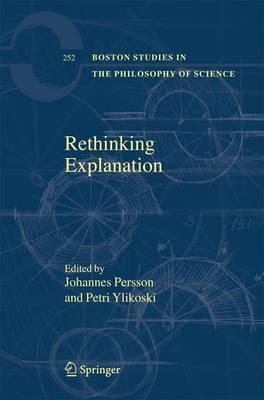Overview
This volume is a product of the international research project Theory of Explanation, which was funded by the Joint Committee for Nordic Research Councils for the Humanities and the Social Sciences (NOS-HS). The project started in 2001 and operated for a period of three years by organizing a number of workshops on scientific explanation in Norway, Iceland, Sweden and Finland. The workshops included presentations by people involved in the project and by invited guests. Both groups are represented in this volume, which brings together some of the papers presented in these meetings. The central theme of the research project was scientific explanation, but it was approached from many different angles. This plurality of approaches is also visible in the present volume. The authors share a joint interest in explanation, but not the same theoretical or methodological assumptions. As a whole, this volume shows that, although the theory of explanation has been a major industry within philosophyof science, there are still both conceptual problems to be solved and fresh philosophical ideas to explore. The papers in this volume have been divided into two broad groups. Part 1 consists of papers dealing with general issues in the theory of explanation, while the papers in Part 2 focus on some more specific problems. Part 1: Theory of Explanation
Full Product Details
Author: Johannes Persson ,
Petri Ylikoski
Publisher: Springer
Imprint: Springer
Edition: 2007 ed.
Volume: 252
Dimensions:
Width: 15.50cm
, Height: 1.30cm
, Length: 23.50cm
Weight: 0.454kg
ISBN: 9789400787087
ISBN 10: 9400787081
Pages: 207
Publication Date: 23 November 2014
Audience:
Professional and scholarly
,
Professional & Vocational
Format: Paperback
Publisher's Status: Active
Availability: Manufactured on demand

We will order this item for you from a manufactured on demand supplier.
Reviews
From the reviews: Rethinking Explanation is Volume 152 of the Boston Studies in the Philosophy of Science. The writing style of all chapters, though academic, is clear, intelligible, comparatively jargon-free for philosophy-suave readers . The present book indicate that inasmuch as all scientific/technological and humanistic knowledge domains retain a rapid expansion into all phases of society there is a great demand for modern approaches to explain . (Karl H. Wolf, International Journal of General Systems, 2008)
From the reviews: 'Rethinking Explanation' is Volume 152 of the Boston Studies in the Philosophy of Science. ... The writing style of all chapters, though 'academic', is clear, intelligible, comparatively jargon-free for philosophy-suave readers ... . The present book ... indicate that inasmuch as all scientific/technological and humanistic knowledge domains retain a rapid expansion into all phases of society there is a great demand for modern approaches 'to explain'. (Karl H. Wolf, International Journal of General Systems, 2008)




